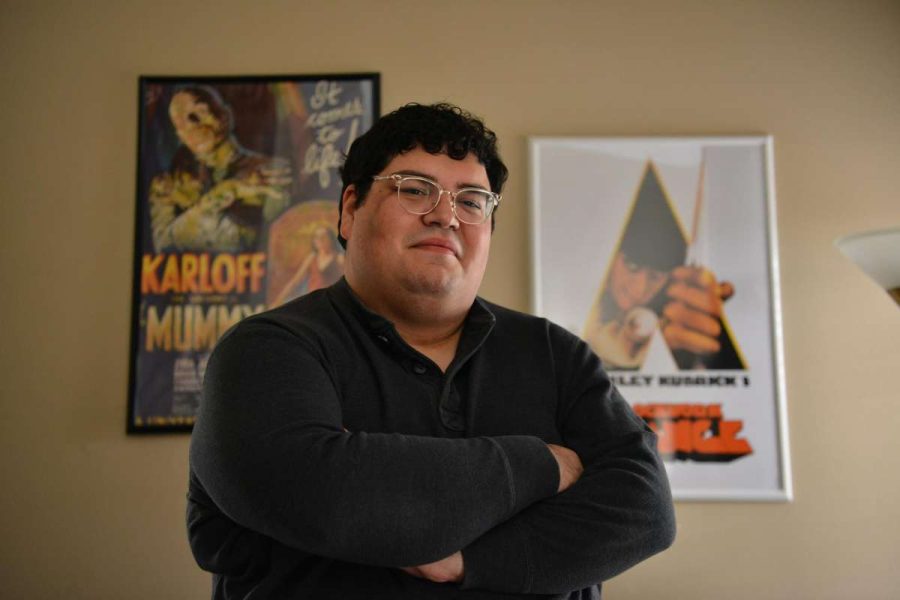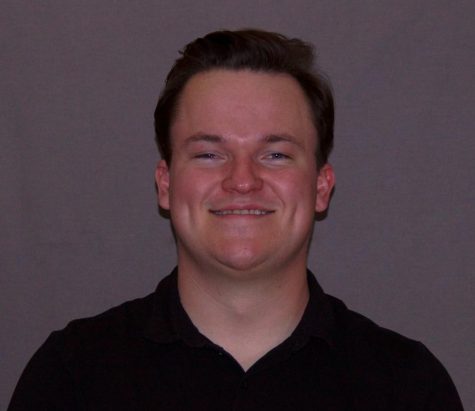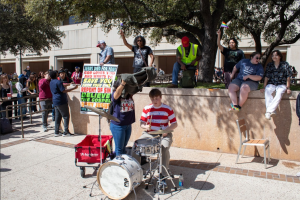A conversation with Alex Ramirez
Local filmmaker and educator discusses his inspirations and career
November 9, 2021
Alex Ramirez, an artist whose reverence for the cinema and the culture that has shaped his work, sat down with me to answer some questions on his filmmaking, his teaching work as well as some of the ways he is inspired by both the past and present.
Alex Ramirez is indisputably a “student of the cinema.” His roots in the theater, coupled with his familial bond over movies, has helped to shape him into the artist he is today. When he’s not working on a new script, Alex is also a teaching artist with SAY Sí. Devoting his time towards helping the underprivileged youth of San Antonio, Ramirez is inextricably shaping future artists with inspiration and creativity that might otherwise go untouched.
Q: Tell me a little bit about yourself and how you got involved in the film scene in San Antonio?
“I grew up on the west side. John Jay High School, Marbach, that whole area. I went to film school down in the valley. That’s really where the technical side started, but I always wanted to make movies. Even when I was in high school doing other electives, movies were always on my mind. However, it’s an industry and a profession that always feels a thousand miles away. But, I always spoke the language of movies with my mom. My dad would always sneak me into movies. So it just became a natural transition. Then I fell in love with theater when I was in high school and through college, that transitioned to writing and directing movies … after college, I came back here to San Antonio.”
Q: Your bio on filmfreeway.com notes that you are a life-long lover of cinema. What were some of the film(s) or director(s) that really ingrained that appreciation?
“Well I’ve always kind of been a Scorsese fan. I think as I’ve gotten older, I’ve gained a real appreciation for directors who really know how to capture feelings. What I mean by that is … a director like Sofia Coppola. My favorite film is “Lost in Translation.” There’s such a feeling imbued in that of loneliness, but also, that you’re a small part of the world. Other filmmakers like Hayao Miyazaki, too. I’ve recently gotten into a lot of Japanese anime. Having come from the theater, I’ve loved the work of David Mamet who has done plays and films. There’s a whole slew of great directors, John Carpenter is another one. It’s not really about staying in one lane in terms of genre or filmmaking.”
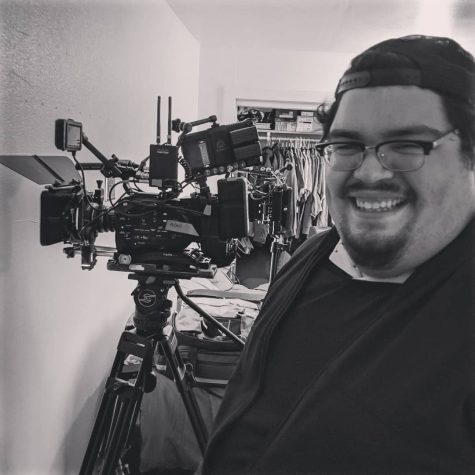
Q: In another interview, you referred to yourself as a “site-specific” artist in relation to the importance of San Antonio in your work. How does the culture of San Antonio inspire you?
“I think some of the sub-cultures have ingrained themselves in what I do. When I was growing up, going to high school, I was in a group of friends who really loved going to the St. Mary’s strip Friday night punk scene, going to shows down at the 1011. Getting really involved in the diy-garage, experimental noise, rock scene. Also, having grown up off Marbach, it’s like its own culture within the west side of San Antonio. A lot of the people I grew up with, the way they talk, the way they comport themselves has kind of seeped into the work that I do. Not in a stereotypical way, but in a way that I try to present as nuanced. Also, San Antonio is kind of a cultural melting pot. It’s been nice to experience lots of different ways of living here and types of people.”
Q: How does San Antonio and its subsequent groups and organizations work to cultivate new filmmakers?
“Obviously, we’re not as huge a market as say an Austin or Atlanta, but there are a lot of great artists here. In teaching youth right now I see a lot of young filmmakers emerging. They’re learning the craft in various ways; taking a film class, doing it in a DIY self-made way, and just rummaging through YouTube videos and putting what they learned on the screen. I’m very hopeful that as the years progress we’re going to continue to grow. I think San Antonio is a naturally rich city of history and art that just kind of needs to be mined.”
Q: In regards to your work with SAY Sí, what inspires you about your students and the up-and-coming artists they are becoming?
“I see myself in them. I try to think, ‘What would I want to hear as a young artist?’ Back in the day, it wasn’t really in vogue to go and get an arts degree or become a filmmaker. Now, I see a young artist who comes to SAY Sí … I want to propel their dreams. I want to say things that will guide them in the right way, because that’s what I would have wanted for myself. Through the work that they do, they’re doing things I couldn’t have even imagined … they’re working with different mediums to make their films. By seeing them do these complex things that are full of excellence and artistry, that just propels me to want to help them more.”
Q: How have your roots in the theater influenced your filmmaking style?
“It’s really influenced my writing style. There’s a certain … ethic when you’re working with an actor who’s theatrically trained. I grew up reading and loving the works of David Mamet, George Bernard Shaw and Shakespeare. You know, all the classics. What I write now is really capturing those universal themes that you see a lot in classic works. Finding ways to really show my appreciation for language … theater is all dialogue – for the most part, that has really informed my writing and what I write about. Rehearsing actors is my favorite part of the process … I love working the scene and figuring out things.”
Q: From a filmic perspective, what were some of the things that inspired “The Quiet Shore” in its pre-production stage?
“I was really into [John] Cassavetes … so, ‘A Woman Under the Influence,’ watching that great Gena Rowlands performance was really transformative. The way he worked with actors … I mean he was an actor’s director … I really loved the visceral attitude that a film like that brought. I was really thinking about Barry Jenkins’ influence for [“Moonlight”] that film which was Wong Kar Wai and “Chungking Express.” With all that mixed in, I wanted to create something I never had really done before, but that I definitely felt, you know we’re back to feelings for filmmakers … I wanted to make something that didn’t wear its heart on its sleeve, but definitely if we’re going to see something heavy let’s just show it. That was where I was coming from.”
Q: One of your next films, “A Life in Technicolor” sort of sits in the realm of nostalgia. Also, you said that your film “Shadowdance” was inspired by the works of Robert Bresson and Paul Schrader. How do the filmmakers of the past inspire your work now?
“I always grew up loving filmmakers, they were my heroes. I was really diving into films I had no business watching. When I was young, I was already kind of watching the films of Sam Raimi mixed in with a Douglas Sirk film or Billy Wilder. I’m very lucky, especially with my mother, that I could talk about these films and older films which she watched, and I could learn parts of the language of cinema. I had great support in that aspect.”
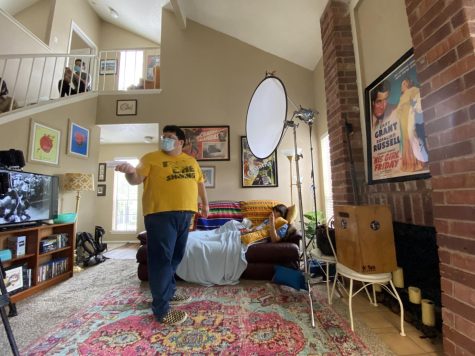
Q: What is some parting advice you can offer to the budding student filmmaker?
“There’s a lot of power in other mediums. Do not fall into this trap of ‘I am only going to watch film.’ In your own work, you essentially recreate moments that are already not exactly reality. There’s power in going to the theater on a Friday night, or going to a symphony, or walking through the park and seeing street artists. You should be like a sponge, try to take all that up. Read a lot. My main source of entertainment is not even film anymore, I read quite a bit. Take in the art of other cultures. I’ve really gotten into Japanese cinema and culture. The way they tell stories is so much different than the way western filmmakers tell their stories, it’s so refreshing. I would much rather – and this might be blasphemy for those who love his work, and I love his work, Steven Spielberg – go see a Yasujirō Ozu film than a Spielberg film at this point because the method of storytelling is so different. Get sucked into other mediums, let them inspire you.”
You can find more about Alex and his projects on his website, alexramirezfilms.com or on his Instagram, @alexrmrz2.
There were other wonderful responses to questions I could not include. If you’re interested, you can find more of my extended conversation with Alex Ramirez on the first episode of the podcast, “Meet.”

